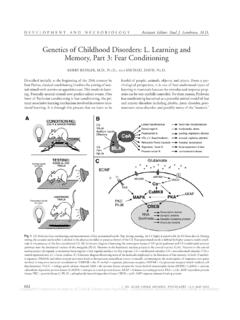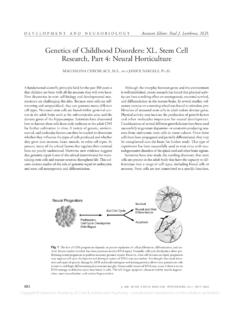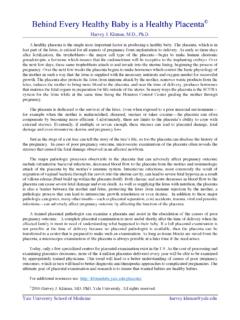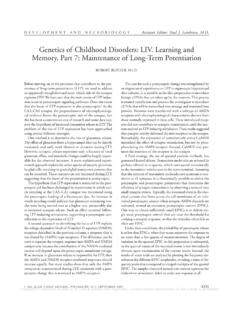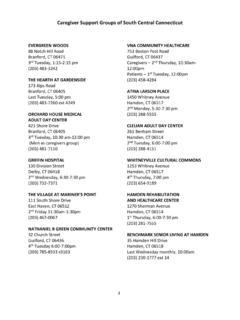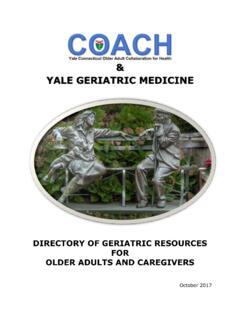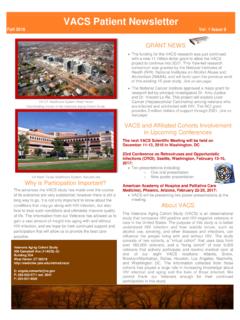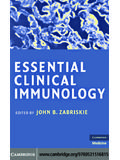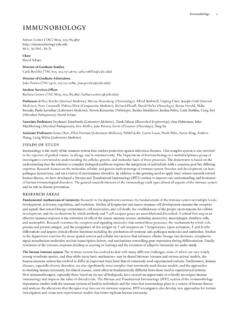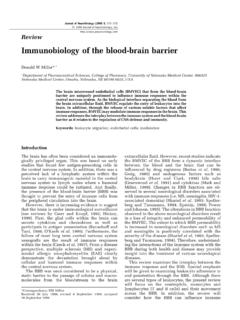Transcription of Department of Immunobiology Ph.D. Graduate Program Program ...
1 Department of Immunobiology Graduate Program Program and Policies Manual 2016-2017 Yale University School of Arts and Sciences School of Medicine Director of Graduate Studies: Dr. Susan Kaech Director of Graduate Admissions, Dr. Jo o Pereira Student Services Officer: Barbara A. Cotton 2 Table of Contents Immunobiology Program OVERVIEW .. 4 Immunobiology Graduate Program ; REQUIREMENTS FOR THE DEGREE .. 4 STUDENTS WHO JOIN Immunobiology .. 6 2016-17 IMMUNOLOGY TRACK FACULTY AND OFFICE STAFF .. 7 2016-2017 Immunobiology Graduate STUDENTS .. 8 YEAR BY YEAR OUTLINE .. 9 THE FIRST YEAR .. 9 COURSE WORK .. 9 HOW DO YOU LEARN ABOUT IMMUNOLOGY RESEARCH AT YALE? .. 10 HOW DO I SELECT A LAB TO ROTATE IN? .. 10 THE TRANSITION BETWEEN BBS TRACKS AND DEPARTMENTAL Graduate 12 THE SECOND YEAR.
2 13 Preprospectus and Prospectus (Qualifying Exam) .. 14 YEAR THREE AND BEYOND ADVANCE TO CANDIDACY .. 16 Committee Meetings .. 17 CAREER DEVELOPMENT AND THE INDIVIDUAL DEVELOPMENT PLAN (IDP) .. 18 CHECKPOINTS IN THE Graduate Program .. 19 POOR ACADEMIC AND SCIENTIFIC PERFORMANCE LEADING TO 20 ADMINISTRATIVE AND ACADEMIC PROCEDURES .. 21 PROCESSING YOUR THESIS .. 22 FELLOWSHIP APPLICATION SESSIONS AND ASSISTANCE .. 23 GUIDELINES FOR THE RESPONSIBLE CONDUCT OF RESEARCH .. 27 VACATION AND SICK LEAVE POLICY .. 36 3 Welcome to the Graduate Program in the Department of Immunobiology at Yale University School of Medicine. Our goal is to provide you with the best possible education in the field of Immunology, through a combination of course work and laboratory research.
3 The Department of Immunobiology and associated departments contain 50 faculty members whose laboratories are performing research in an extremely wide range of topics in Immunology and related disciplines. The guiding philosophy of the Department is that research and learning are fundamentally collaborative, and are dramatically enhanced by access to individuals with diverse expertise and interests. Therefore, we have worked hard to create a supportive and cooperative environment that stresses excellence in research. Students routinely make use of the technical and intellectual expertise of multiple different laboratories, and we urge you to take advantage of the superb resources (faculty, post-docs, Graduate students and state-of-the-art technology) that are all around you.
4 As the Directors of Graduate Admission and Graduate Study, we together with the Program s Coordinator, are responsible for overseeing your progress and ensuring that your Program of study meets the highest educational standards. All of the other faculty and staff of the Department of Immunobiology , are here to help you make the most of your Graduate years. We wish you great success in your research and studies. 4 Immunobiology Program Overview The Yale Immunobiology Graduate Program is an independent component of Yale Graduate School. It is designed to provide the education, intellectual support and supervision necessary for students to obtain the degree in Immunology. The guidelines and rules described on the pages that follow are intended to provide high standards, firm guidance and flexibility, and to ensure that students are directed towards research problems that are significant and technically practical.
5 Students enter the Program through the Biological and Biomedical Sciences (BBS) Program of Yale Graduate School. Students are admitted to one of the seven Tracks of BBS, and during the first year, BBS and the Tracks oversee student education. During this year, students take courses, do three research rotations, and become familiar with the wide variety of research opportunities available in the biological sciences at Yale. By the end of the first year, students select a laboratory in which to do their thesis research. The choice of a thesis laboratory will, in most cases, determine which degree granting Graduate Program a student enters. Hence, it is possible for a student in any Track of BBS in the first year to become a member of any of the departmentally based Graduate Programs in the second (and subsequent) years.
6 For the Immunobiology Graduate Program , the typical route of entry is via the Immunology Track of BBS. But students from other tracks occasionally choose a thesis supervisor in Immunobiology and enter the Immunobiology Graduate Program . In the second year, students continue with course work, begin thesis research in earnest, and take the Prospectus exam. In addition, during the second and third years, students serve as teaching assistants in two or more courses. With the Prospectus exam successfully completed, students are admitted to candidacy for the and in the third and subsequent years, focus the great majority of their efforts on the research that will form the basis of the dissertation. Our goal is for students to complete and defend their dissertation within five or six years of matriculation, although some finish during their sixth year; semesters beyond the sixth year are possible but require special approval.
7 A Thesis Committee of three to five faculty carefully monitors progress toward the degree; and mentored review meetings occur every six months. Immunobiology Graduate Program ; Requirements for the Degree Administrative Immunology Graduate Program Offices Professor Susan Kaech, Director of Graduate Studies TAC S641B, 785-2423 Professor Jo o Pereira, Director of Graduate Admissions, TAC S541, 737-2089 Professor David Schatz, Program Director of Immunology Training Grant, TAC S625D, 737-2255 Barbara Cotton, Student Services Officer, TAC 625, 785-3857 Susan Kaech, PhD, Director Grad Studies Joao Pereira, PhD, Admissions Director Barbara Cotton, Student Services 5 BBS/PhD Students Academic and Research Requirements 1.
8 Three research rotations. Summer rotations prior to matriculation do not count toward the three rotation requirement. Rotation 1: 09/12-11/18 Rotation 2: 11/28-02/17 Rotation 3: 2/27-04/28 Join Thesis Lab, May 8 2. Six Graduate level science courses, taken for a grade and passed in the first three years. Pass/Fail courses (such as IBIO 600a, 601b, 611, 612, 613) audited courses do not count toward this requirement. 3. A grade average of at least High Pass and a minimum of two Honors required by the end of the 4th semester. 4. Ibio 530a: Biology of the Immune System a. Required unless consultation with DGS and course director determine that passing the previous year final exam shows sufficient knowledge in subject. Does not reduce the six course requirement 5.
9 Ibio 531b: Advanced Immunology 6. Two advanced seminar courses (choose from IBIO 536, 537, 538, 539) a. Seminar courses are typically available three out of four semesters. First seminar must be taken for a grade. If the student has completed six graded courses, then the seventh class (seminar) can be audited. 7. Ibio 600a, Introduction to Research (Pass/Fail) 8. Ibio 601b, Responsible Conduct in Research, all first year students (Pass/Fail) 9. Ibio 611a, 612a, 613b, Laboratory Research Training (Pass/Fail) 10. Ibio 503b, Responsible Conduct in Research, Refresher Course. Required for all 4th year students. 11. Teaching: two, one semester long science courses. a. Only one course needs to be taught to advance to candidacy; the second teaching requirement can be fulfilled later, but is required for the b.
10 The Yale McDougal Center offers a one day seminar entitled Teaching at Yale Attending this seminar is recommended prior to teaching 12. Pre-prospectus and successful completion of prospectus exam, both oral and written components. 13. First committee meeting (year three or first meeting post the prospectus/qualifying exam-- usually one year later). Three forms with committee signatures required: i) committee meeting form, ii) Advancement to Candidacy Form, iii) IDP certificate. 14. Advance to Candidacy by the end of semester six (all requirements met and 3rd year committee report submitted, as discussed in #13). 15. Annual or semi-annual committee meetings following Advance to Candidacy meeting. 16. Permission from the thesis committee to begin writing the PhD thesis, documented by the PI in a written report submitted to the DGS, student, and all committee members.
